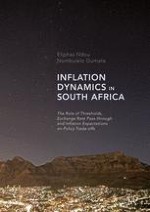2017 | OriginalPaper | Buchkapitel
10. Negative Terms-of-Trade Shock, the Real Effective Exchange Rate and Repo Rate Adjustments
verfasst von : Eliphas Ndou, Nombulelo Gumata
Erschienen in: Inflation Dynamics in South Africa
Aktivieren Sie unsere intelligente Suche, um passende Fachinhalte oder Patente zu finden.
Wählen Sie Textabschnitte aus um mit Künstlicher Intelligenz passenden Patente zu finden. powered by
Markieren Sie Textabschnitte, um KI-gestützt weitere passende Inhalte zu finden. powered by
